PLC Batteries
-

Tadiran
6-Pack Tadiran AA 3.6V 1.8Ah TLH/ iXTRA (SL-560/S) Primary Lithium Batteries
$151.49As low as: -

Tadiran
12-Pack Tadiran TL-5276/W 3.6V 1.0 Ah Lithium Batteries w/ 2 Pin Connector
$159.49As low as: -

Tadiran
6-Pack Tadiran TL-4920/S XOL Series 3.6V C 8.5 Ah Lithium Batteries (ER26500 / LS26500)
$166.99As low as: -

Tadiran
6-Pack Tadiran TL-5920/S 3.6V C 8.5 Ah Lithium Batteries (ER26500 / LS26500)
$166.99As low as: -

-
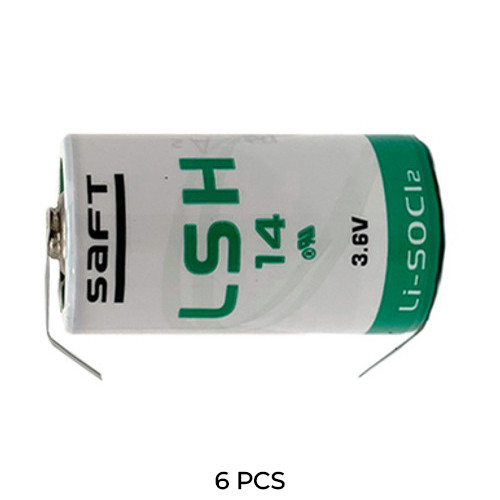
-

-

Tadiran
6-Pack Tadiran TL-5920/S 3.6V C 8.5 Ah Lithium Batteries (ER26500 / LS26500) with Tabs
$172.79As low as: -
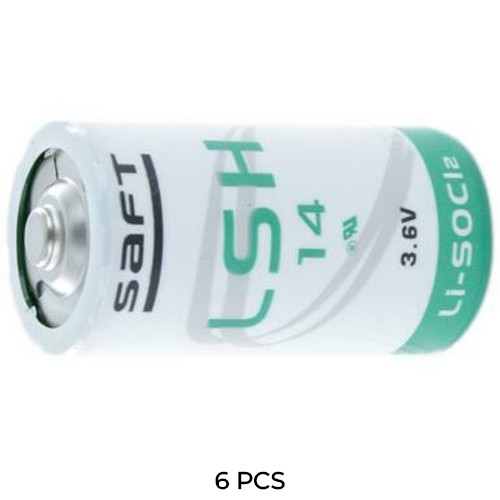
-

-

Tadiran
6-Pack Tadiran TL-2300/S 3.6V D 16.5 Ah Lithium Battery (LSH20 / LS33600)
$205.39As low as: -
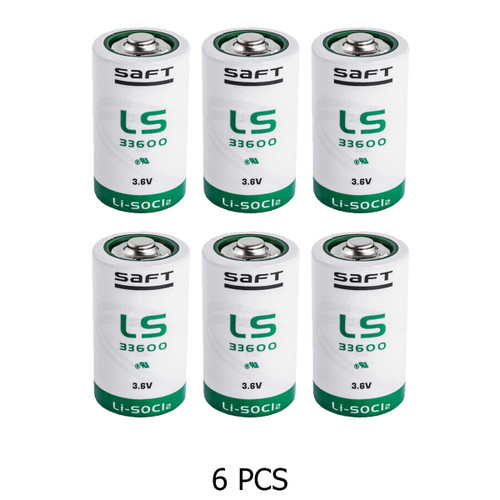
-

OmniCel
8-Pack Omnicel 3.6 Volt D 19000 mAh (ER34615 / LSH20 / LS33600) Primary Lithium Batteries
$209.99As low as: -

Tadiran
6-Pack Tadiran TL-5930/S 3.6V D 19 Ah Lithium Batteries (LSH20 / LS33600)
$219.39As low as: -
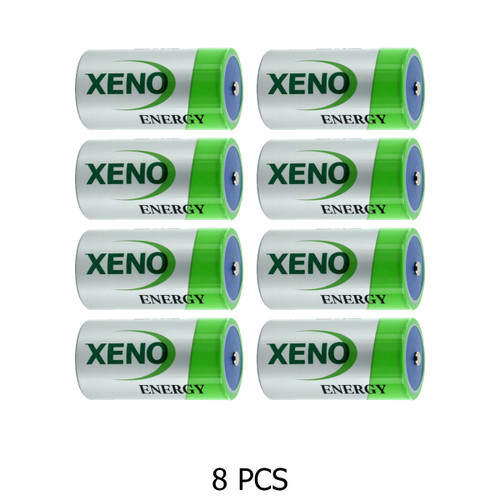
-

Tadiran
6-Pack Tadiran TL-4930/S XOL Series 3.6V D 19 Ah Lithium Batteries (LSH20 / LS33600)
$236.79As low as: -
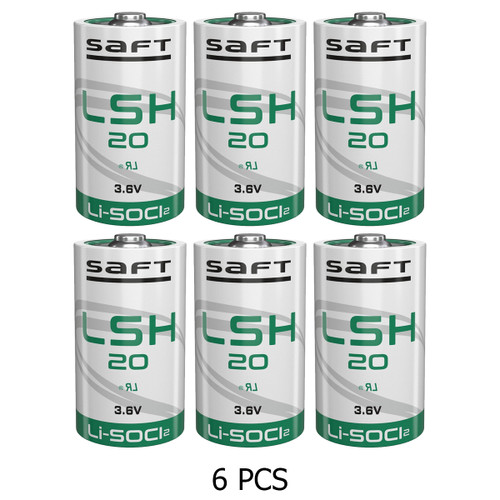
-

-

Tadiran
12-Pack Tadiran TL-2200/S 3.6V C 7.2 Ah Lithium Batteries (ER26500 / LS26500)
$270.09As low as: -

-

Tadiran
12-Pack Tadiran TL-4920/S XOL Series 3.6V C 8.5 Ah Lithium Batteries (ER26500 / LS26500)
$327.09As low as:
PLC BATTERIES
Comprehensive Guide to PLC Batteries: Powering Industrial Automation
Programmable Logic Controllers (PLCs) are the cornerstone of industrial automation, orchestrating complex processes with precision and efficiency. To ensure these systems operate seamlessly, PLC batteries play a critical role. These specialized batteries provide reliable backup power, safeguarding data integrity and system functionality during power interruptions.
What Are PLC Batteries?
PLC batteries, often referred to as backup batteries or memory batteries, are designed to maintain essential functions in PLC systems when external power is unavailable. Their primary role includes:
Data Preservation: Retaining critical programming data and settings in the PLC's memory.
Uninterrupted Functionality: Ensuring continuous operation during power outages or system maintenance.
Long-Term Reliability: Delivering stable performance over extended periods, even in harsh industrial conditions.
Unlike standard consumer batteries, PLC batteries are engineered for demanding applications, featuring high energy density, low self-discharge rates, and wide operating temperature ranges.
Types of PLC Batteries
PLC batteries come in various configurations to suit the diverse needs of industrial automation. Below are some of the most common types:
1. AriCell ER14250 (LS14250): 1/2 AA 3.6 Volt Primary Lithium Battery
Capacity: 1200 mAh
Voltage: 3.6 volts
Features: Compact size, high energy density
Applications: Ideal for PLCs with limited space constraints
The AriCell ER14250 is widely used for its compact design, making it a go-to choice for PLCs where space efficiency is critical.
2. ER14335: 2/3 AA Primary Lithium Battery
Capacity: 1650 mAh
Voltage: 3.6 volts
Features: Higher capacity for extended battery life
Applications: Suitable for moderate-demand PLC systems
The ER14335 offers a balance between size and capacity, making it a versatile option for a variety of industrial applications.
3. ER14505: AA Primary Lithium Battery
Capacity: 2700 mAh
Voltage: 3.6 volts
Features: Superior capacity, long-lasting performance
Applications: Best suited for high-drain PLCs and systems requiring extended backup power
The ER14505 is ideal for demanding environments, providing reliable energy for PLCs with high power requirements.
Features and Benefits of PLC Batteries
PLC batteries are designed with specific features to ensure optimal performance in industrial settings. These include:
High Energy Density: Enables compact designs while delivering substantial power reserves.
Low Self-Discharge: Maintains charge for extended periods, ensuring readiness even after prolonged storage.
Wide Operating Temperature Range: Performs reliably in extreme conditions, from freezing cold to high heat.
Durability: Withstands the rigors of industrial environments, including vibration, dust, and moisture.
Longevity: Offers a lifespan of several years, reducing the need for frequent replacements and minimizing downtime.
Customization Options: Tailoring Batteries to Your Needs
To cater to the specific requirements of industrial automation, PLC batteries are available with various customization options:
Tabs: Provide secure connections for integration into PLC systems.
Axial Leads: Allow easy soldering and installation in compact spaces.
Connectors: Enable quick and hassle-free replacement during maintenance.
These customization options simplify the installation process, enhance compatibility, and improve overall system efficiency.
Choosing the Right PLC Battery
Selecting the correct PLC battery is essential for ensuring system reliability and minimizing operational disruptions. Key considerations include:
Voltage and Capacity: Match the battery's specifications to the requirements of your PLC model to avoid compatibility issues.
Size and Form Factor: Choose a battery that fits your PLC's physical constraints.
Environment: Consider batteries with wide operating temperature ranges for use in extreme conditions.
Brand and Quality: Opt for reputable brands like AriCell, Xeno, or similar to ensure reliability and performance.
Lifecycle Cost: While high-quality batteries may have a higher upfront cost, their longevity and reliability often result in lower long-term expenses.
Popular PLC Battery Brands
1. AriCell
Known for precision engineering and reliability, AriCell produces high-performance batteries like the ER14250 and ER14505, which are widely used in industrial applications.
2. Xeno
Xeno batteries, such as the XL-050F, are favored for their durability and consistent performance in harsh environments. They are designed to meet the rigorous demands of industrial automation.
3. Other Leading Brands
Brands like Saft, Tadiran, and Panasonic also manufacture high-quality PLC batteries, offering diverse options to suit various industrial requirements.
Maximizing Battery Performance
To ensure optimal performance and longevity of your PLC batteries, follow these best practices:
Scheduled Replacements: Replace batteries according to the manufacturer's recommended timeline to prevent unexpected failures.
Proper Storage: Store unused batteries in a cool, dry place to maintain their charge and lifespan.
Regular Inspections: Check batteries for signs of corrosion or damage and replace them promptly if needed.
Use Manufacturer-Approved Batteries: Always use batteries recommended by the PLC manufacturer to ensure compatibility and reliability.
Empowering Industrial Automation with Reliable Power
In the fast-paced and precision-driven world of industrial automation, the importance of reliable power solutions cannot be overstated. PLC batteries are the backbone of critical systems, providing the uninterrupted power needed to maintain operations, preserve data, and prevent costly downtime.
Whether you're using compact options like the AriCell ER14250 or high-capacity solutions like the ER14505, choosing the right PLC battery ensures that your automation systems continue to operate seamlessly. With features like high energy density, long life, and customization options, these batteries empower industries to achieve their goals with confidence and efficiency.

